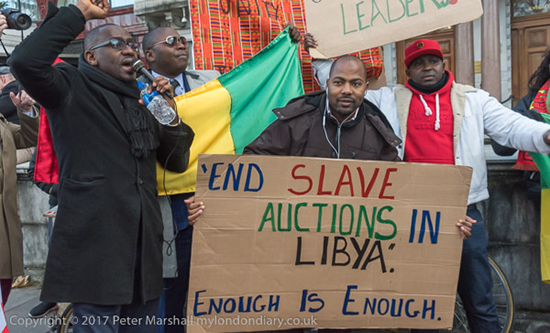
Despite talks in December 2018 between Libya’s two rival governments, bombings and gangland killings continued into 2019, as a UN report described the ‘unimaginable horrors’ of life for migrants. In the eight years since the NATO-led invasion in March 2011, Libya has been turned from a postcolonial state into an anarchic wasteland, fought over by warlords, slave owners, imperialist politicians and oil corporations. Britain’s MPs voted 557 to 13 for the war. They include current Labour Shadow Defence Secretary Nia Griffith and Shadow Foreign Secretary Emily Thornberry. Now British, EU and US-backed forces are stoking the fires of barbarism.
During the Gaddafi era, political and economic power remained in the hands of a nationalist petit bourgeoisie. Libyans enjoyed free education and healthcare, job security and protections for women’s rights. Facing economic crisis and isolation following the collapse of the socialist bloc, a dominant section of the Libyan ruling class had by the 1990s began to push for denationalisation and self-enrichment. The government began working with imperialist agencies including the CIA and MI6. Britain deported suspected dissidents back to Libya and British agents supervised interrogations. Under the 1997-2005 governments, Shell, BP and other multinationals struck lucrative deals.
Deals were struck with China, India, Russia and Japan in the Gaddafi government’s final years, but the terms were not favourable enough for US oil giants, as Libya insisted on the state retaining part-ownership. Gaddafi’s perceived regional ambitions, curbs on imperialist investment, plans for a regional African currency and opposition to US and EU imperialist interventions in Ukraine and Africa couldn’t be tolerated. Numbers killed during the NATO bombing of Libya were put at 30,000, with 50,000 injured, by the pro-intervention National Transitional Council.
Libya is now a main transit country for up to 90% of Africa’s refugees attempting to get to Europe, and a class of gangsters and profiteers are making a fortune from the destruction of Libyan civil society, as the EU shuts its doors to migrants. The UN Commission for Human Rights report published in December 2018 gives a horrific snapshot of migrant life. An ‘overwhelming majority’ of women and older girls migrating via Libya report being gang-raped by traffickers or having witnessed others being led away to be abused. Refugees forced into detention in Libya are subject to ‘torture, ill-treatment, forced labour, and rape by the guards.’
Around 40 migrant detention camps in Libya hold up to 700,000 people; many are run by armed criminal gangs, who sell migrants to others and extort multiple ransoms. The open sale of slaves made small print headlines in Western newspapers in 2017, but continues with impunity. Having already spent €200m on attempting to prevent migration, the EU has tried unsuccessfully to have its ‘border’ moved to Libya to establish asylum processing centres. Overall in 2018, 2,262 people died attempting to reach Europe’s shores across the Mediterranean.
Migrant experiences in Libya are the sharp end of a broader crisis in a country without a functioning state, witnessing Islamist bombings, extra-judicial killings, lawlessness, the destruction of state welfare and divided institutions. 40% of Libyans live below the UN poverty line and over 45% of youth are unemployed (World Bank 2017 figures, published September 2018).
There are currently two rival governing forces in Libya: a Tripoli-based Government of National Accord (GNA) under Prime Minister Gayyez Sarraj, and the Tobruk House of Representatives (HoR), backed up by General Khalifa Haftar, whose forces control much of eastern Libya. While the Sarraj regime weakly holds the capital, Haftar’s forces control the ‘oil crescent’ in the Gulf of Sirte, with four major ports and most of Libya’s import-export market. Oil production remains steady despite the stand-off, but has still not reached the levels of the Gaddafi era.
Despite a series of talks brokered by European powers pushing farcically for elections, the war in Libya continues to rage. Haftar’s Libyan National Army (NLA) is in violent confrontation with a number of smaller militias, including Islamic State forces. Amidst the destruction of Libya, deepening international rivalries are being played out. Sarraj’s Tripoli-based government is internationally recognised and has the open sponsorship of Turkey and Qatar, while the Tobruk government receives backing from Egypt, the United Arab Emirates, and increasingly, France and Russia.
Throughout 2018, France pushed for elections to be held in December, but these never materialised. Italy, with backing from the US, opposes the French plan, and calls for national reconciliation before any election. Haftar’s allies oppose Italy’s ‘blatant interference in Libyan internal affairs’, and have called for Russian intervention to stand up to the encroachments of Italy, Turkey and Qatar; the NLA wants to ‘liberate’ the country militarily before any election. Echoing tensions with US imperialism on Syria, Turkey is clinging to its diminishing influence with Tripoli and, like Qatar, has been a noted supporter of the Muslim Brotherhood.
Britain is hedging its bets and, despite then Foreign Secretary Boris Johnson’s meeting with Haftar in August 2017, has continued to provide military equipment to the GNA. On 3 January Angus Mckee, the British Chargé d’Affaires in Libya, met with GNA ministers to discuss requests to train the Tripoli regime’s security forces. British ally Saudi Arabia is playing both sides. Salafi groups are promoting Saudi-sponsored religious conservatism and control militias, intelligence services, prisons and mosques. Under this influence, Haftar’s forces have cracked down on ‘blasphemous’ cultural displays and banned women under 60 from travelling without male relatives.
Donald Trump raised eyebrows in January by saying that Libya would have been better off under Gaddafi, and expressed a view increasingly pursued by the US ruling class: that Libya needs a ‘strong’ leader. More compliant than Gaddafi, US officials see Egyptian dictator Sisi as the model. A new deadline for presidential and parliamentary elections has been set for summer 2019. The imperialists are on a collision course and regional rivalries are sharpening.
Louis Brehony
Fight Racism! Fight Imperialism! 268 February/March 2019




